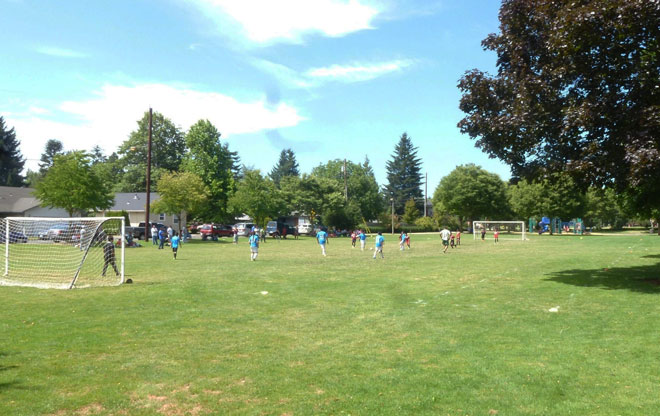
Sports Fields
Ed Benedict Park is dominated by large grass sports fields always in use. You will see teams that range in age from preschool to seniors. Some of the larger older trees around the perimeter of the fields are remnants from the landscape of the homes that used to be on this property.
Image: Brian Bainnson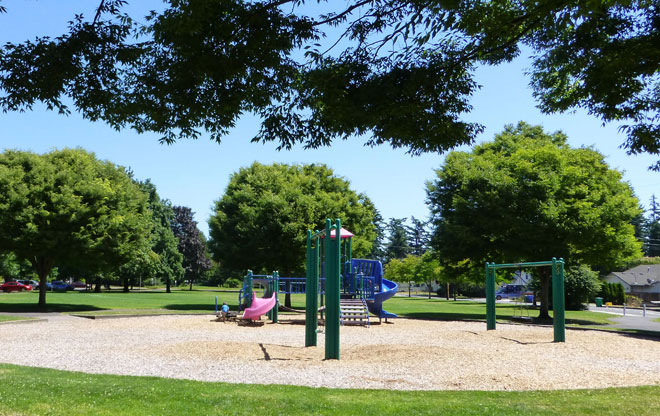
Well-sited Playground
The park has two play areas with fairly traditional metal play equipment. The play space is well sited to minimize conflicts between older users of the park and the smaller children using the play areas. Families with children playing in sporting events can watch their other children in the play area while keeping an eye on the game.
Image: Brian Bainnson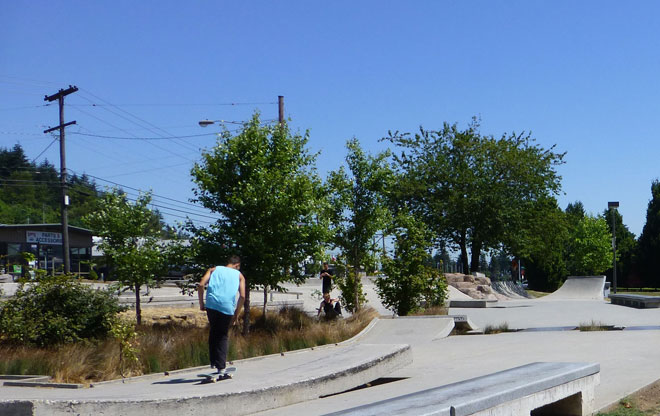
Skate Park
A recent addition, an innovative skate park, was one of the first of its kind to integrate stormwater management. Working with artists, Newline Skate Parks, the designers, used concrete sculptural elements to reveal how the stormwater gets back into the ground while creating a dynamic skate landscape. The skate park is well-used by all ages and hosts skate camps during the summer.
Image: Brian Bainnson 
Contemplative Place
A stone sculpture entitled Contemplative Place by Michihiro Kosuge creates a secluded grove. Each of the four main stones is placed to represent the cardinal directions.
Image: Brian Bainnson 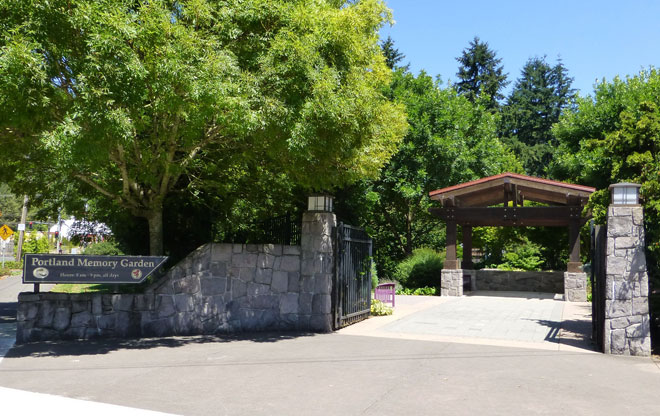
Gate Encloses and Protects
The entrance to the Portland Memory Garden is meant to be easy to recognize so users of the garden understand how to get in and out of the space. The garden is fully enclosed by a decorative fence to keep those with dementia from wandering off. The gates also allow a caregiver to close the garden to promote safe wandering without worry.
Image: Brian Bainnson 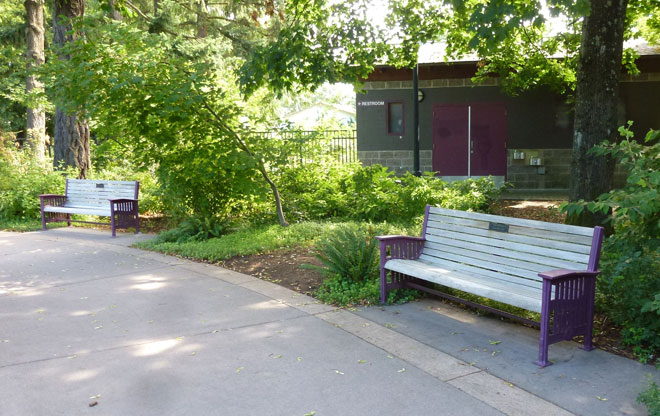
Easy and Accessible
A wide loop path winds around the main section of the garden with a bench or a seat wall only a few steps away. Benches where chosen to be easy to get in and out of, while the path is bordered by a contrasting colored concrete band so the visually impaired can stay on the walk.
Image: Brian Bainnson 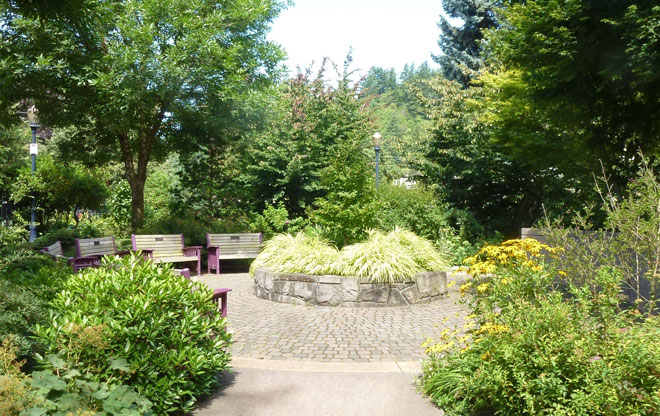
Space for Horticultural Therapy
Getting a person with dementia outdoors provide numerous benefits. It has been shown that most dementia patients spend most of their time inside and in artificial light that leads to various sleeping disorders that only add to the confusion and disorientation these patient experience. Access to sunlight helps maintain a healthy sleep wake cycle. Most facilities that host dementia patients, including the majority that are cared for in private homes, have no access to outdoor spaces, let alone a garden designed specifically for their needs.
Image: Brian Bainnson 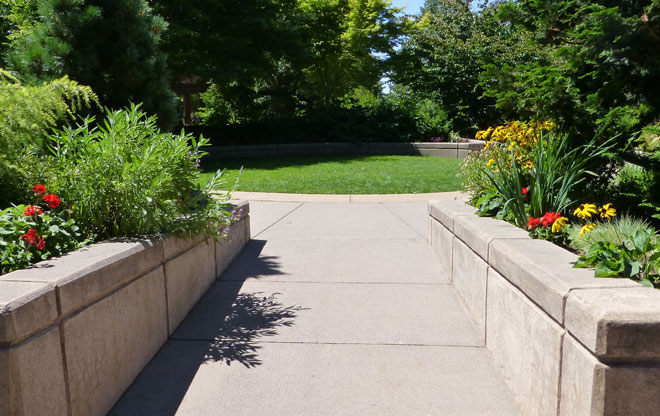
Raised Beds so Everyone Can Access
Access to nature improves cognition in those in the early stages of Alzheimer's. Many families said trips to the garden with a parent dealing with dementia have been among the most interactive experiences they've had with their loved ones. One family that used the garden with both their mother and father in their final years had such a positive experience, they are now using a portion of their parents estate to build a memory garden in their parents home town of Aurora, Illinois.
Image: Brian Bainnson 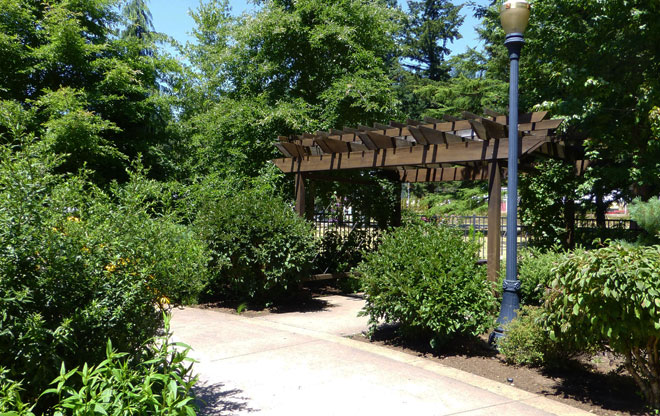
Shade as a Design Element
Shade was one of the most important elements in design of the garden. This site was chosen for a number of reasons, but the presence of large mature trees for shade was one of the most important ones. The design also included a wood trellis to create more shade for a small activity area.
Image: Brian Bainnson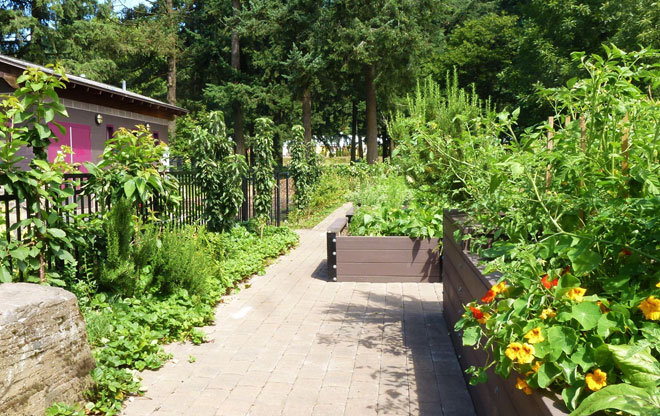
Community Garden for All
The Ed Benedict Community Garden is one of the newest in the Portland system. This garden was designed to complement the Memory Garden. It has a number of raised beds and accessible walking surfaces to encourage gardeners of all abilities. The Friends of the Portland Memory Garden maintain edible garden demonstration areas. Food goes to the community of gardeners.
Image: Brian Bainnson